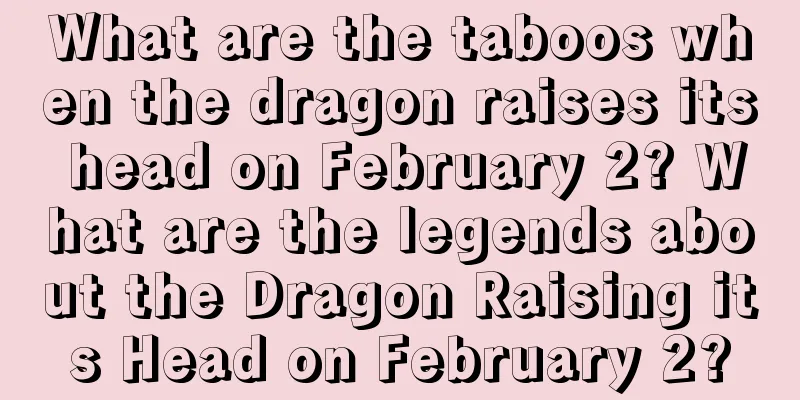What are the taboos when the dragon raises its head on February 2? What are the legends about the Dragon Raising its Head on February 2?

On the second day of the second lunar month every year, people have some celebrations, including some traditional customs and activities. Every festival has taboos, and the Dragon Raising its Head is no exception. So what are the taboos on the second day of the second lunar month? What are the legends about the Dragon Raising its Head on February 2?What are the taboos when the dragon raises its head on February 2?1. Don’t use needles, threads or scissors2. Do not let the bucket touch the wellhead 3. Don’t use a roller 4. Don’t eat noodles 5. Married daughters should not spend the second day of the second lunar month at their parents’ home. 6. Avoid giving birth at your parents’ home 7. Avoid saying "jealous" Lunar calendar information for this day in 2021Lunar calendar time: February 2, Xinchou year, Xinmao month, Xinyou day, Gregorian calendar time: March 14, 2021 [According to the old almanac]Getting married, getting a license, repairing a grave, breaking ground, breaking house, getting married, Signing a contract, seeking medical treatment, marrying a son-in-law, and accepting a son-in-law [taboos in the old almanac] Moving, renovation, opening, moving into a new home, starting construction, breaking ground, Door installation, bed installation, travel, engagement, burial, beam raising, Opening a business, cooking, traveling, taking up a post, building, praying, Opening of business, livestock collection, marriage proposal, migration, house building, crowning, Erecting pillars, planting, making beds, releasing water, separating, closing accounts, opening warehouses God of Wealth God of Joy: Southwest God of Fortune: Northwest God of Wealth: Due East What are the legends about the Dragon Raising its Head on February 2?Legend 1: Fuxi and the Dragon Raising its Head on February 2Legend has it that this festival originated in the period of Fuxi, the first of the Three Sovereigns. The soil is plowed during the Waking of Insects, and the earth's energy flows during the Spring Equinox, which is when the spring ploughing season starts. Fuxi "emphasized agriculture and farming", and on the second day of February every year, "the empress sent food, and the emperor personally ploughed the fields", taking care of one acre and three mu of land. Later, Huangdi, Tang Yao, Yu Shun and Xia Yu all followed the example of the former king. By the time of King Wu of Zhou, this traditional practice was not only continued, but also continued as an important national policy. During the Qing Dynasty, Emperor Yongzheng began to change the second day of the second lunar month to leave the Old Summer Palace and go to the "Yi Mu Garden" (now the west side of the Old Summer Palace in Haidian District) to plow the fields. There was a New Year painting called "Emperor Ploughing the Fields" with a couplet inscribed on it: "On the second day of the second lunar month, the dragon raises its head. The emperor plows the land and his ministers drive oxen. The empress comes to deliver food and the ministers of the court throw away the seeds. The world is led by plowing in spring and weeding in summer, and there is a bumper harvest in autumn." This painting also shows that people hoped for an enlightened emperor who would personally plow the fields in spring and weed in summer to ensure that the people had enough food and clothing. This is the historical legend of the Dragon Head Festival. Legend 2: Wu Zetian and the Dragon Raising its Head on February 2 According to legend, when Wu Zetian became emperor, the Jade Emperor ordered that no rain should fall on earth for three years. However, the Jade Dragon in charge of the Milky Way could not bear to see the people suffer from the disaster and starve, so he secretly sent down a heavy rain. When the Jade Emperor found out, he knocked the Jade Dragon in charge of the Milky Way down from the Heavenly Palace and pressed him under a huge mountain. There is also a monument at the foot of the mountain, on which is written: The Dragon King violated the rules of heaven by bringing rain, and should be punished by the mortal world for thousands of years. If you want to climb Lingxiao Pavilion again, you have to wait until the golden beans bloom. In order to save the Dragon King, people searched everywhere for the flowering golden beans. On the second day of the second month of the following year, people were turning over and drying the golden corn seeds when they suddenly remembered that the corn was like golden beans. If it was fried and bloomed, wouldn't that be the golden beans blooming? Then every household popped popcorn, set up an altar in the yard, burned incense, and offered "flowering golden beans" specifically for the Dragon King and the Jade Emperor to see. When the Jade Emperor saw golden bean flowers blooming in the courtyards of every household on earth, he had no choice but to order the Dragon King to return to heaven and continue to create clouds and rain for the world. From then on, it became a custom among the people that on the second day of the second lunar month, people would pop popcorn and fry beans. Adults and children alike would chant, "On the second day of the second month, the dragon raises its head, the big granaries are full, and the small granaries are overflowing." In some places, stove ash is spread into big circles in the yard, and grains are placed in the middle, which is called "da granary" or "filling the granary." The meaning is to wish for a good harvest and full granaries in the new year. During festivals, it is common to add the title of "dragon" to the names of foods. Eating dumplings is called eating "dragon ears"; eating spring rolls is called eating "dragon scales"; eating noodles is called eating "dragon whiskers"; eating rice is called eating "dragon seeds"; eating wontons is called eating "dragon eyes". Legend 3: Shaving the Dragon’s Head and the Dragon Raising its Head on February 2 In ancient times, people used the twenty-eight constellations to indicate the positions of the sun, moon and stars in the sky to determine the seasons and remind farmers of the farming time. There are a lot of records about this in the Book of Rites: Monthly Ordinances. Among the twenty-eight constellations, seven of them, namely Jiao, Kang, Di, Fang, Xin, Wei and Ji, form a complete dragon-shaped constellation, among which Jiao is like the two horns of a dragon. On the night of the second day of the second lunar month, the two horns of the dragon (Spica and Alpha Centauri) slowly rise from the eastern horizon, hence the name "the dragon raising its head." People hope that the dragon will raise its head to create clouds and rain, and nourish all things, and there is a saying that "on the second day of the second month, shave the dragon's head". A folk proverb says, "Shaving the dragon's head on the second day of the second month will bring you a spirited and energetic year." Shaving the dragon's head on this day reflects people's good wishes to pray for the dragon to bless them with good luck and fortune. |
Recommend
For those born at the hour of You during the winter solstice of the Year of the Pig in 2019, is the lucky element gold? How do you see?
Is gold the lucky element for those born at the ho...
Is it a good time to open a business on August 7, the day after the Autumnal Equinox in 2020? What are the climate characteristics of the Autumnal Equinox?
Introduction: It is necessary to choose an auspici...
Is the fate of a girl born on September 18th of the lunar calendar good? Are you destined to be rich and powerful?
Introduction: A new life is born every day, but th...
What are the customs of the Chushu solar term? What traditional food do you eat?
The Chushu solar term is the second solar term in ...
When is the Mid-Autumn Festival on August 15, 2020? How to live the most meaningful life?
The Mid-Autumn Festival mainly originates from the...
What is the zodiac sign for people born on the sixth day of the twelfth lunar month in 2018?
The sixth day of the twelfth lunar month in 2018 i...
Lunar August 27, 2019: Good and bad luck, good and bad luck
The days in the lunar calendar have a distributio...
Feng Shui tips to increase your chances of a successful blind date
Introduction: When children have not found a suit...
Is the eighth day of the third lunar month in 2018 a good day to travel? What should I pay attention to?
Going outing in spring is one of my country's ...
March 16, 2020·Is it good to sign a contract and make money on the 23rd day of the second lunar month?
Many things require timing and luck. The success o...
How about the 18th day of the eighth lunar month in 2018? Is it a good time to travel far away?
Introduction: According to the tradition of our co...
What is the fate of a baby boy born on May 19, 2021? Is his life fortune good?
Time always flows by us like a stream. In a blink ...
Are there any particular customs for eating Tangyuan during the Lantern Festival?
Introduction: The Lantern Festival is a traditiona...
Is the first day of the eighth lunar month in 2022 an auspicious day for sacrifice? When is the best time for sacrifice?
Since ancient times, the objects of worship in tra...
Can I pick up the car on July 14, 2019? How can a novice determine whether a car is new?
Not every day is a suitable day to pick up a car,...









